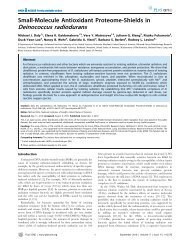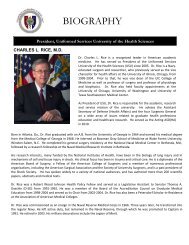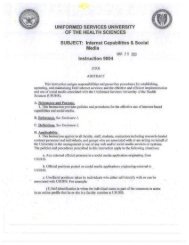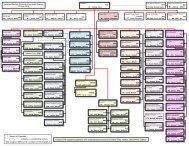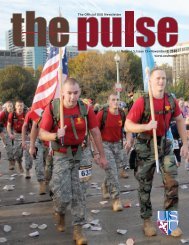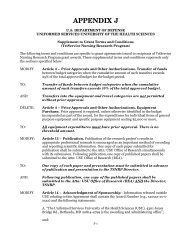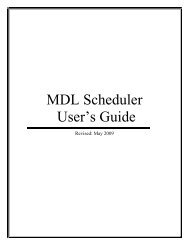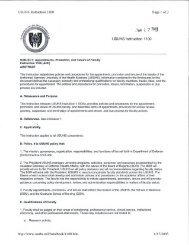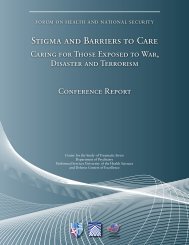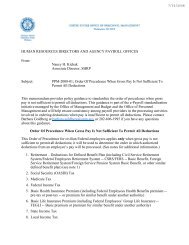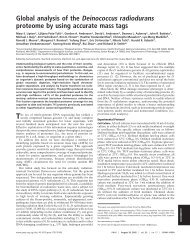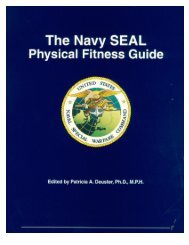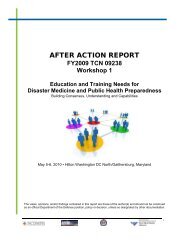Vol. 8, Issue 5 April 15, 2013 - Uniformed Services University of the ...
Vol. 8, Issue 5 April 15, 2013 - Uniformed Services University of the ...
Vol. 8, Issue 5 April 15, 2013 - Uniformed Services University of the ...
Create successful ePaper yourself
Turn your PDF publications into a flip-book with our unique Google optimized e-Paper software.
Frontline experience inspires <strong>of</strong>ficer to choose<br />
military medicine<br />
By Christine Creenan-Jones, editor<br />
Army 2nd Lt. Braden Hestermann (second from left) is a fourth-year medical student at <strong>the</strong> <strong>Uniformed</strong> <strong>Services</strong> <strong>University</strong>. Before he arrived on<br />
campus, Hestermann was a medical platoon leader in Iraq and served alongside many servicemembers, including Sgt. 1st Class Ben Sebban (far<br />
left), who was killed by a roadside bomb, Sgt. John Gilbert (third from left) and Sgt. Tony Trout (right).<br />
Courtesy Photo<br />
Army 2nd Lt. Braden Hestermann,<br />
a fourth-year medical student at <strong>the</strong><br />
<strong>Uniformed</strong> <strong>Services</strong> <strong>University</strong>, has<br />
seen a lot in his short military career.<br />
After graduating from West Point in<br />
2004, he spent <strong>15</strong> long months on Iraq’s<br />
brutal frontlines.<br />
While <strong>the</strong>re, Hestermann came<br />
face-to-face with war’s most dire<br />
consequences. In 2007, he was a<br />
medical platoon leader working<br />
in Diyala, a dangerous province<br />
controlled by Sunni insurgents. Fighting<br />
was fierce in Diyala, and many<br />
servicemembers were badly wounded<br />
or killed in battle.<br />
Hestermann helped as much as<br />
he could by calling MEDEVACs and<br />
coordinating patient evacuations<br />
to major military hospitals, but he<br />
still felt powerless as colleagues and<br />
friends around him grappled with<br />
life-changing injuries.<br />
“I wanted to help so badly, but all I<br />
could do was call an Evac, watch and<br />
wait,” he said. “It was a terrible feeling.”<br />
By <strong>the</strong> end <strong>of</strong> his tour, Hestermann<br />
was ready for a new career path. He<br />
wanted to be a military doctor, so he<br />
could take care <strong>of</strong> wounded servicemembers<br />
like <strong>the</strong> ones he’d served<br />
with in Iraq.<br />
“USU was a no-brainer for me,”<br />
Hestermann said. “I wanted to stay in<br />
<strong>the</strong> Army, and USU gives you a better<br />
exposure to military medicine than any<br />
o<strong>the</strong>r medical school around.”<br />
On course to graduate in May,<br />
Hestermann will move to San<br />
Antonio by <strong>the</strong> end <strong>of</strong> <strong>the</strong> summer,<br />
where he’ll begin his residency in<br />
anes<strong>the</strong>siology at Brooke Army<br />
Medical Center.<br />
“Anes<strong>the</strong>siology is a great fit for<br />
me,” he said. “It’s a hands-on discipline.<br />
Plus, I like to know that what<br />
I’m doing is helping, and in this field,<br />
you get immediate feedback.”<br />
Hestermann’s excitement for his<br />
future is tempered only by <strong>the</strong> memories<br />
he’s created at USU. He’s president <strong>of</strong><br />
a tight-knit class that has bonded over<br />
<strong>the</strong>ir tough classes, military training,<br />
field exercises and rotations.<br />
“I’ve had such a great experience<br />
here,” Hestermann said. “The<br />
camaraderie at USU is incredible,<br />
because we are all working toward<br />
<strong>the</strong> same goal. I’ll hold onto <strong>the</strong>se<br />
experiences forever.”<br />
<strong>April</strong> <strong>15</strong>, <strong>2013</strong> 5



